
Charles Walter Stansby Williams was a British poet, novelist, playwright, theologian, literary critic, and member of the Inklings, an informal literary discussion group associated with C. S. Lewis and J. R. R. Tolkien at the University of Oxford.

Henry Green was the pen name of Henry Vincent Yorke, an English writer best remembered for the novels Party Going, Living and Loving. He published a total of nine novels between 1926 and 1952.

Richard Horatio Edgar Wallace was a British writer.

Mary Theresa Eleanor Higgins Clark was an American author of suspense novels. Each of her 51 books was a bestseller in the United States and various European countries, and all of her novels remained in print as of 2015, with her debut suspense novel, Where Are the Children?, in its seventy-fifth printing.
Victor Canning was a prolific British writer of novels and thrillers who flourished in the 1950s, 1960s and 1970s. He was personally reticent, writing no memoirs and giving relatively few newspaper interviews.

Robert Cedric Sherriff, FSA, FRSL was an English writer best known for his play Journey's End, which was based on his experiences as an army officer in the First World War. He wrote several plays, many novels, and multiple screenplays, and was nominated for an Academy Award and two BAFTA awards.
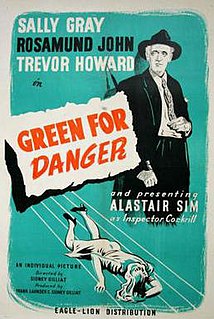
Green for Danger is a 1946 British thriller film, based on the 1944 detective novel of the same name by Christianna Brand. It was directed by Sidney Gilliat and stars Alastair Sim, Trevor Howard, Sally Gray and Rosamund John. The film was shot at Pinewood Studios in England. The title is a reference to the colour-coding used on the gas canisters used by anaesthetists.
Jonathan Quayle Higgins III, VC is a fictional character in the 1980–1988 comedy and crime television series, Magnum, P.I. portrayed by actor John Hillerman. Hillerman won an Emmy for the role in 1987.
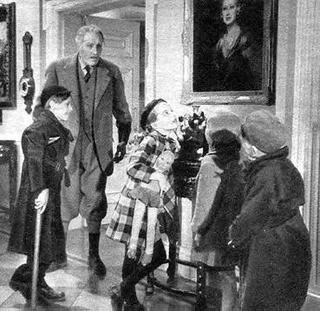
Medal for the General is a 1944 British comedy film directed by Maurice Elvey. The screenplay by Elizabeth Baron is based on the novel of the same title by James Ronald.

Bernard Charles Newman was a British writer of 138 books, both fiction and non-fiction. His works have been translated into over 20 languages including Japanese and Braille. An historian, he was considered an authority on spies, but also wrote books concerning travel and politics. His fiction included mystery novels, plays, science fiction and children's books.
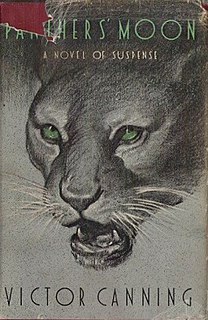
Panther's Moon is a 1948 spy thriller novel by the British writer Victor Canning. It was his second post-war novel, following The Chasm, as he had largely been taken a break from writing during his wartime service.
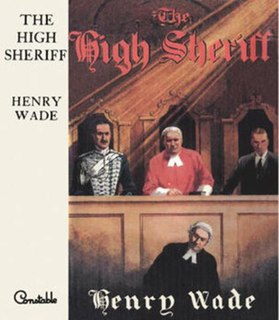
The High Sheriff is a 1937 mystery detective novel by the British writer Henry Wade. Wade was a writer of the Golden Age of Detective Fiction, best known for his series featuring Inspector Poole. This was one of a number of stand-alone novels he wrote, structured as a partially inverted detective story.

Mr. Finchley Discovers His England is a 1934 comedy novel by the British writer Victor Canning. It was published by Hodder and Stoughton, and a US edition published by Reynal and Hitchcock appeared in 1935 under the title Mr. Finchley's Holiday, and there were post-war editions from Pan Books, Heinemann and, recently (2019), from Farrago Books. It was the first of a trilogy starring the mild-mannered Edgar Finchley. The novel was a bestseller and allowed Canning to leave his job and devote himself full time to writing, later becoming known in particular for his thrillers.
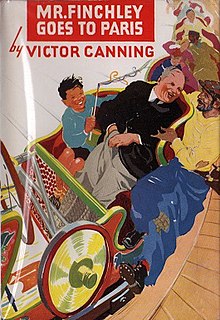
Mr. Finchley Goes to Paris is a comedy novel by the British writer Victor Canning. It was the second of a trilogy featuring the mild-mannered Edgar Finchley. The first publication in 1938 was by Hodder and Stoughton in the UK and Carrick and Evans in the USA. It was included in the Heinemann Uniform Edition of 1974, and a new edition has recently appeared (2019) from Farrago Books. In 1990 it was adapted for radio by the BBC starring Richard Griffiths
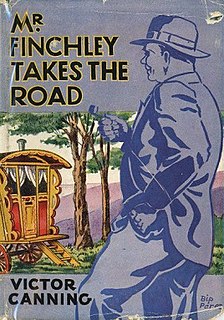
Mr. Finchley Takes the Road is a 1940 comedy novel by the British writer Victor Canning. It was the final part of a trilogy featuring the mild-mannered Edgar Finchley who had been introduced in the 1934 novel Mr. Finchley Discovers His England. First publication was by Hodder and Stoughton with an American edition by Carrick and Evans. It was included in the 1973 Uniform Edition by Heinemann, and has been reissued by Farrago Books in 2019. In 1990 it was adapted for radio by the BBC starring Richard Griffiths.
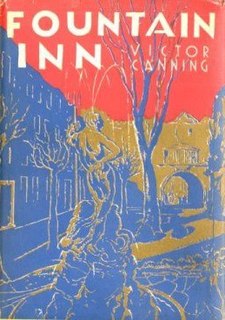
Fountain Inn is a 1939 mystery detective novel by the British writer Victor Canning. Canning had made his name with his comedy novels featuring Mr. Finchley. This was his first attempt at a thriller, but after the war he increasingly switched to writing thrillers. It received positive reviews with The Guardian noting "Fountain Inn, which is extremely well written, is the attractive kind of detective story in which the main interest is not “Who?” but “How?”". The first edition was by Hodder and Stoughton, but there was a reissue in 1974 by Heinemann, and it was republished in 2019 by Farrago Books.

The Chasm is a 1947 thriller novel by the British writer Victor Canning. It was his first novel since the Second World War during which he had served in the Royal Artillery and was largely absent from the writing world. Later he increasingly turned to espionage and crime novels. It takes place in Italy where Canning had served during the Italian campaign.
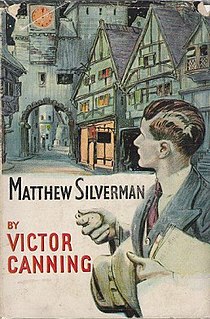
Matthew Silverman is a 1937 novel by the British writer Victor Canning, his sixth. Canning had made his name with the comedy novel Mr. Finchley Discovers His England and wrote a number of works focusing on more everyday aspects of British life before later switching to be a well-known author of thrillers. The first publisher was Hodder and Stoughton, but a new edition has recently (2019) appeared from Farrago Books under the title The Uncertain Future of the Silvermans.

Queen's Pawn is a 1969 thriller novel by the British writer Victor Canning. The title is a reference to the chess opening of the same name and the fact that much of the novel's action centres around the Queen Elizabeth 2 ocean liner. It was his first novel after finishing the Rex Carver series of spy adventures.

The Viaduct is a 1939 historical novel by the British writer Victor Canning, under the pen name of Alan Gould. The novel revolves around the construction of a railway viaduct across the River Tamar in the Cornish village Caradon in the 1870s overseen by the engineer John Seabright. It faces many obstacles including an outbreak of typhoid and the constant tension between the local inhabitants and the rough navvies brought into build it, ending up in a death and a trial.
















